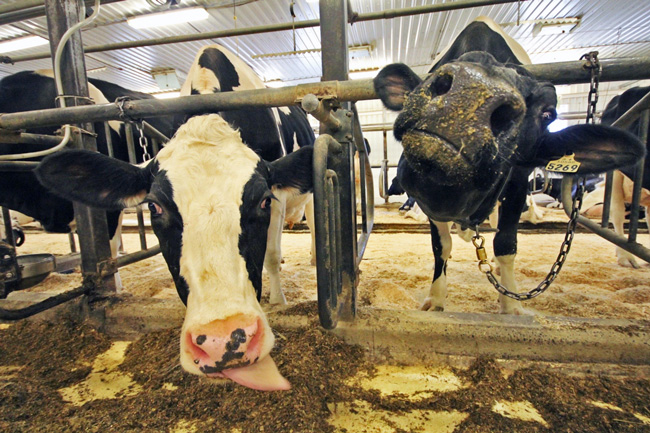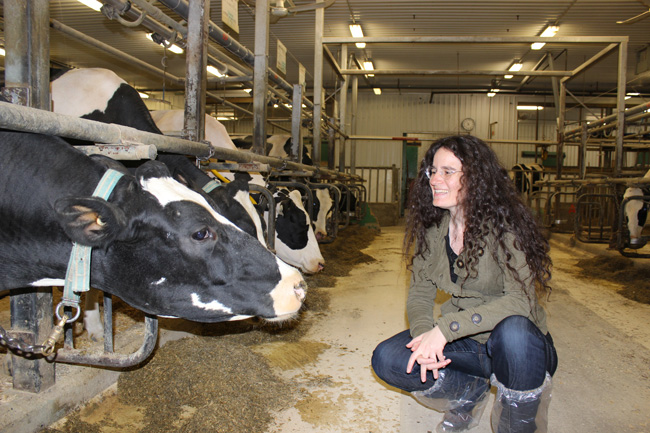
By Neale McDevitt
For the 80+ cows at the Macdonald Campus dairy farm, last Thursday was just another day at the office eating food and producing top-quality milk. They were blissfully unaware that some 200 yards away an initiative was being launched that may forever change their lives – and the profit margin of dairy producers – for the better.
May 26 marked the official installation of Professor Elsa Vasseur as Industrial Research Chair in Sustainable Life of Dairy Cattle. The Chair, in the Department of Animal Science, is a five-year, $1.8 million joint venture funded by the Natural Sciences and Engineering Research Council of Canada (NSERC), Novalait, Dairy Farmers of Canada, and Valacta.
One of the main challenges faced by Quebec dairy farmers is cow longevity. Typically, a milk producer won’t begin seeing a return on their investment until a cow’s third lactation – at about 4-5 years old). However, less than 40 per cent of Quebec’s dairy cows reach that critical third lactation – often being involuntarily culled from the herd due to illness, injury or other health problems.

“Economically speaking, having a cow in the herd longer makes sense,” said Vasseur. The trick, she continues, is to present dairy producers with hard evidence that animal welfare is profitable because to this point it is still a hypothesis. “A cow that is more comfortable is a more productive cow that stays longer in the herd – but we have to prove it. That is the work of this study, and we intend to put more numbers into it as proof.
“We are going to try to establish some norms because what ever we propose, we need to provide producers with the real costs. Yes, there will be a cost to make modifications and implement new practices, but at the end of the day producers will make more money,” said Vasseur.
Combining research from animals on the Macdonald Campus dairy farm with data from Valacta, an on-Campus Quebec-based organization that gathers and analyzes data about dairy farming best practices across Eastern Canada, Vasseur’s research team will develop well-being indicators in cows, working toward evidence that comfort and longevity are advantageous both economically and environmentally.
To that end, Vasseur’s team will be examining a wide array of issues related to dairy farming – right down to the very minutiae of the ergonomics of individual stalls, including the optimal length and placement of tethers and the best type and quantity of bedding. (Get more details about the project).
During her introductory remarks, Anja Geitmann, Dean of the Faculty of Agricultural and Environmental Sciences (FAES), said the new Chair in Sustainable Life of Dairy Cattle, is a prime example of research that impacts the daily lives of people.
“The FAES (Faculty of Agricultural and Environmental Sciences) is proud to feature cutting edge science in disciplines that are of interest and relevance both to its immediate community and the general world population,” said Geitmann. “[Professor Vasseur’s Chair] is a great opportunity to showcase that McGill’s research has tangible outcomes.
“The FAES represents an excellent opportunity for outreach, having the only operating dairy farm on the Island of Montreal, a few minutes from a large urban population. There is magic in seeing kids realizing for the first time that milk comes from a cow,” said Geitmann. “The farm offers us the opportunity to show that agriculture is a domain that evolves, that adopts new technologies with the aim to increase yield while protecting our environment for the future.”
Related stories
When the cows come home, how long will they stay?
Mac Farm’s milk is cream of the crop once again
